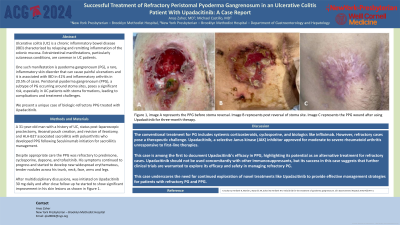Sunday Poster Session
Category: IBD
P0999 - Successful Treatment of Refractory Peristomal Pyoderma Gangrenosum in an Ulcerative Colitis Patient With Upadacitinib: A Case Report
Sunday, October 27, 2024
3:30 PM - 7:00 PM ET
Location: Exhibit Hall E

Has Audio
- AZ
Anas Zaher, MD
New York-Presbyterian / Brooklyn Methodist Hospital
Brooklyn, NY
Presenting Author(s)
Anas Zaher, MD, Michael Castillo, MD
New York-Presbyterian / Brooklyn Methodist Hospital, Brooklyn, NY
Introduction: Ulcerative colitis (UC) is a chronic inflammatory bowel disease (IBD) characterized by relapsing and remitting inflammation of the colonic mucosa. Extraintestinal manifestations, particularly cutaneous conditions, are common in UC patients. One such manifestation is pyoderma gangrenosum (PG), a rare, inflammatory skin disorder that can cause painful ulcerations and it is associated with IBD in 41% and inflammatory arthritis in 20.5% of cases. Peristomal pyoderma gangrenosum (PPG), a subtype of PG occurring around stoma sites, poses a significant risk, especially in UC patients with stoma formations, leading to complications and treatment challenges. We present a unique case of biologic-refractory PPG treated with Upadacitinib.
Case Description/Methods: A 31-year-old man with a history of UC, status post-laparoscopic proctectomy, ileoanal pouch creation, and revision of ileostomy, and HLA-B27 associated sacroiliitis with polyarthritis who developed PPG following Secukinumab initiation for sacroiliitis management. Despite appropriate care the PPG was refractory to prednisone, cyclosporine, dapsone, and tofacitinib. His symptoms continued to progress and started to develop new widespread erythematous, tender nodules across his trunk, neck, face, arms and legs. After multidisciplinary discussions, was initiated on Upadacitinib 30 mg daily and after close follow up he started to show significant improvement in his skin lesions as shown in Figure 1.
Discussion: The conventional treatment for PG includes systemic corticosteroids, cyclosporine, and biologics like infliximab. However, refractory cases pose a therapeutic challenge. Upadacitinib, a selective Janus kinase (JAK) inhibitor approved for moderate to severe rheumatoid arthritis unresponsive to first-line therapies. This case is among the first to document Upadacitinib's efficacy in PPG, highlighting its potential as an alternative treatment for refractory cases. Upadacitinib should not be used concomitantly with other immunosuppressants, but its success in this case suggests that further clinical trials are warranted to explore its efficacy and safety in managing refractory PG. This case underscores the need for continued exploration of novel treatments like Upadacitinib to provide effective management strategies for patients with refractory PG and PPG.

Disclosures:
Anas Zaher, MD, Michael Castillo, MD. P0999 - Successful Treatment of Refractory Peristomal Pyoderma Gangrenosum in an Ulcerative Colitis Patient With Upadacitinib: A Case Report, ACG 2024 Annual Scientific Meeting Abstracts. Philadelphia, PA: American College of Gastroenterology.
New York-Presbyterian / Brooklyn Methodist Hospital, Brooklyn, NY
Introduction: Ulcerative colitis (UC) is a chronic inflammatory bowel disease (IBD) characterized by relapsing and remitting inflammation of the colonic mucosa. Extraintestinal manifestations, particularly cutaneous conditions, are common in UC patients. One such manifestation is pyoderma gangrenosum (PG), a rare, inflammatory skin disorder that can cause painful ulcerations and it is associated with IBD in 41% and inflammatory arthritis in 20.5% of cases. Peristomal pyoderma gangrenosum (PPG), a subtype of PG occurring around stoma sites, poses a significant risk, especially in UC patients with stoma formations, leading to complications and treatment challenges. We present a unique case of biologic-refractory PPG treated with Upadacitinib.
Case Description/Methods: A 31-year-old man with a history of UC, status post-laparoscopic proctectomy, ileoanal pouch creation, and revision of ileostomy, and HLA-B27 associated sacroiliitis with polyarthritis who developed PPG following Secukinumab initiation for sacroiliitis management. Despite appropriate care the PPG was refractory to prednisone, cyclosporine, dapsone, and tofacitinib. His symptoms continued to progress and started to develop new widespread erythematous, tender nodules across his trunk, neck, face, arms and legs. After multidisciplinary discussions, was initiated on Upadacitinib 30 mg daily and after close follow up he started to show significant improvement in his skin lesions as shown in Figure 1.
Discussion: The conventional treatment for PG includes systemic corticosteroids, cyclosporine, and biologics like infliximab. However, refractory cases pose a therapeutic challenge. Upadacitinib, a selective Janus kinase (JAK) inhibitor approved for moderate to severe rheumatoid arthritis unresponsive to first-line therapies. This case is among the first to document Upadacitinib's efficacy in PPG, highlighting its potential as an alternative treatment for refractory cases. Upadacitinib should not be used concomitantly with other immunosuppressants, but its success in this case suggests that further clinical trials are warranted to explore its efficacy and safety in managing refractory PG. This case underscores the need for continued exploration of novel treatments like Upadacitinib to provide effective management strategies for patients with refractory PG and PPG.

Figure: Figure 1, image A represents the PPG before stoma reversal. Image B represents post reversal of stoma site. Image C represents the PPG wound after using Upadacitinib for three-month therapy.
Disclosures:
Anas Zaher indicated no relevant financial relationships.
Michael Castillo indicated no relevant financial relationships.
Anas Zaher, MD, Michael Castillo, MD. P0999 - Successful Treatment of Refractory Peristomal Pyoderma Gangrenosum in an Ulcerative Colitis Patient With Upadacitinib: A Case Report, ACG 2024 Annual Scientific Meeting Abstracts. Philadelphia, PA: American College of Gastroenterology.
